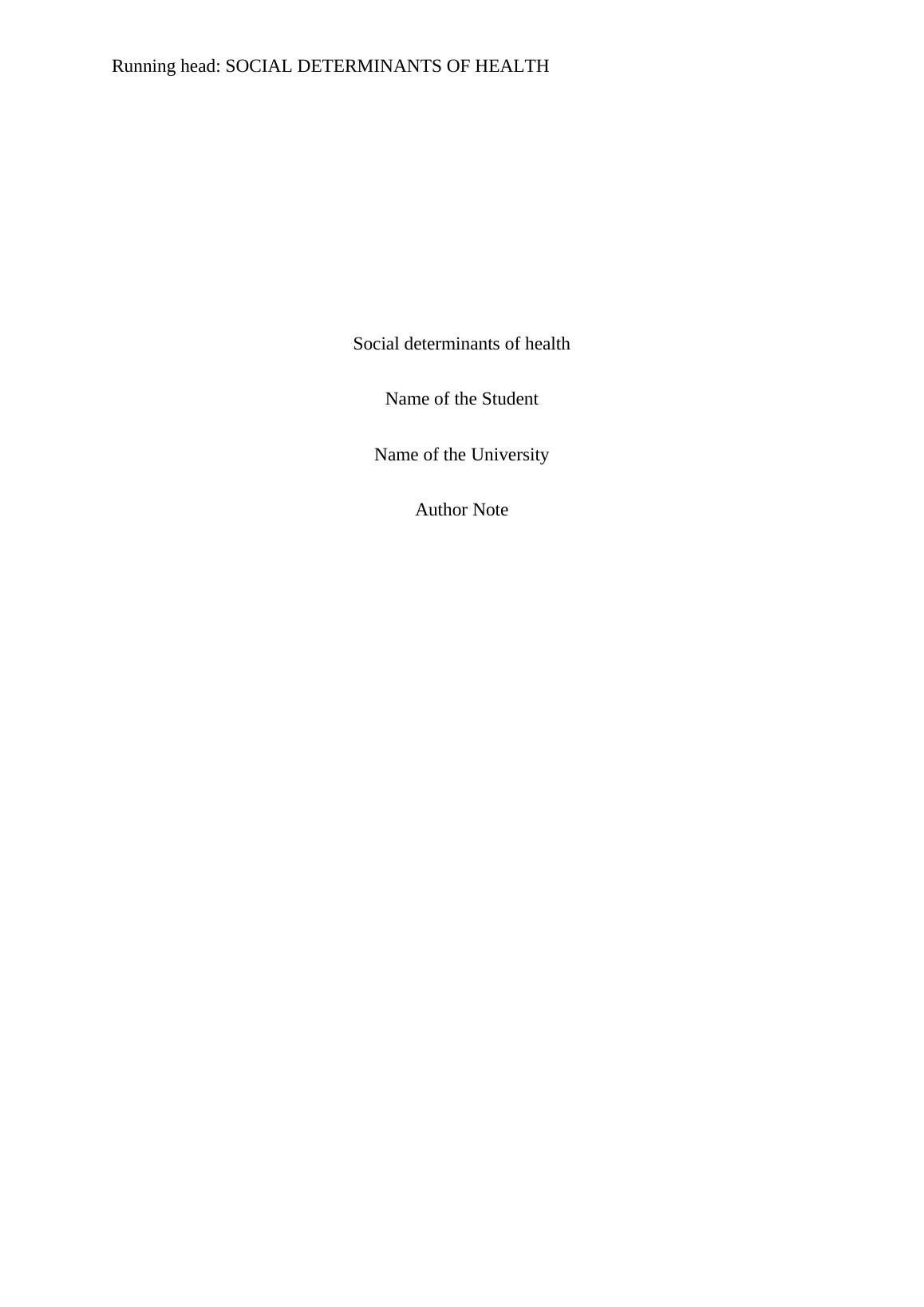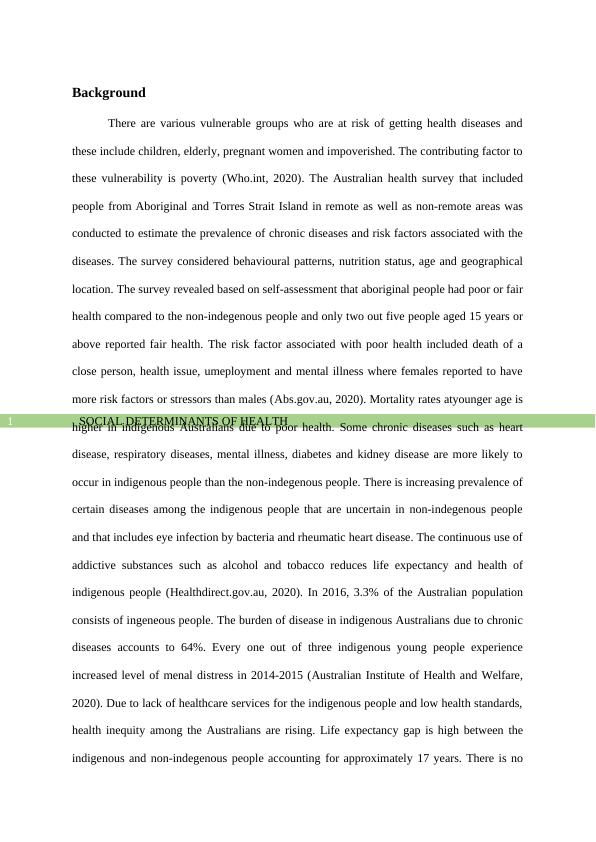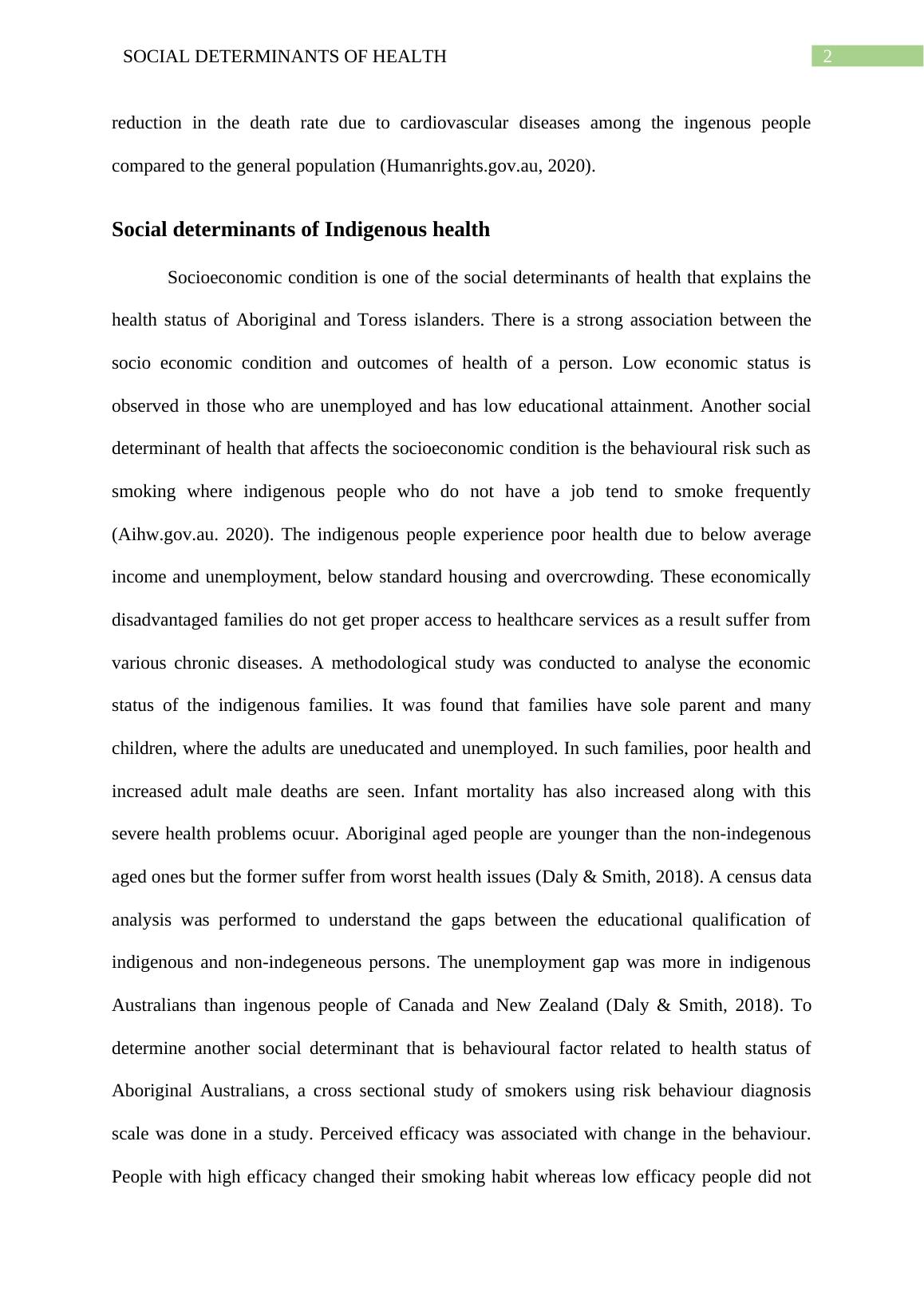Social determinants of Indigenous Health | Study
7 Pages1675 Words22 Views
Added on 2022-08-27
Social determinants of Indigenous Health | Study
Added on 2022-08-27
ShareRelated Documents
Running head: SOCIAL DETERMINANTS OF HEALTH
Social determinants of health
Name of the Student
Name of the University
Author Note
Social determinants of health
Name of the Student
Name of the University
Author Note

SOCIAL DETERMINANTS OF HEALTH1
Background
There are various vulnerable groups who are at risk of getting health diseases and
these include children, elderly, pregnant women and impoverished. The contributing factor to
these vulnerability is poverty (Who.int, 2020). The Australian health survey that included
people from Aboriginal and Torres Strait Island in remote as well as non-remote areas was
conducted to estimate the prevalence of chronic diseases and risk factors associated with the
diseases. The survey considered behavioural patterns, nutrition status, age and geographical
location. The survey revealed based on self-assessment that aboriginal people had poor or fair
health compared to the non-indegenous people and only two out five people aged 15 years or
above reported fair health. The risk factor associated with poor health included death of a
close person, health issue, umeployment and mental illness where females reported to have
more risk factors or stressors than males (Abs.gov.au, 2020). Mortality rates atyounger age is
higher in indigenous Australians due to poor health. Some chronic diseases such as heart
disease, respiratory diseases, mental illness, diabetes and kidney disease are more likely to
occur in indigenous people than the non-indegenous people. There is increasing prevalence of
certain diseases among the indigenous people that are uncertain in non-indegenous people
and that includes eye infection by bacteria and rheumatic heart disease. The continuous use of
addictive substances such as alcohol and tobacco reduces life expectancy and health of
indigenous people (Healthdirect.gov.au, 2020). In 2016, 3.3% of the Australian population
consists of ingeneous people. The burden of disease in indigenous Australians due to chronic
diseases accounts to 64%. Every one out of three indigenous young people experience
increased level of menal distress in 2014-2015 (Australian Institute of Health and Welfare,
2020). Due to lack of healthcare services for the indigenous people and low health standards,
health inequity among the Australians are rising. Life expectancy gap is high between the
indigenous and non-indegenous people accounting for approximately 17 years. There is no
Background
There are various vulnerable groups who are at risk of getting health diseases and
these include children, elderly, pregnant women and impoverished. The contributing factor to
these vulnerability is poverty (Who.int, 2020). The Australian health survey that included
people from Aboriginal and Torres Strait Island in remote as well as non-remote areas was
conducted to estimate the prevalence of chronic diseases and risk factors associated with the
diseases. The survey considered behavioural patterns, nutrition status, age and geographical
location. The survey revealed based on self-assessment that aboriginal people had poor or fair
health compared to the non-indegenous people and only two out five people aged 15 years or
above reported fair health. The risk factor associated with poor health included death of a
close person, health issue, umeployment and mental illness where females reported to have
more risk factors or stressors than males (Abs.gov.au, 2020). Mortality rates atyounger age is
higher in indigenous Australians due to poor health. Some chronic diseases such as heart
disease, respiratory diseases, mental illness, diabetes and kidney disease are more likely to
occur in indigenous people than the non-indegenous people. There is increasing prevalence of
certain diseases among the indigenous people that are uncertain in non-indegenous people
and that includes eye infection by bacteria and rheumatic heart disease. The continuous use of
addictive substances such as alcohol and tobacco reduces life expectancy and health of
indigenous people (Healthdirect.gov.au, 2020). In 2016, 3.3% of the Australian population
consists of ingeneous people. The burden of disease in indigenous Australians due to chronic
diseases accounts to 64%. Every one out of three indigenous young people experience
increased level of menal distress in 2014-2015 (Australian Institute of Health and Welfare,
2020). Due to lack of healthcare services for the indigenous people and low health standards,
health inequity among the Australians are rising. Life expectancy gap is high between the
indigenous and non-indegenous people accounting for approximately 17 years. There is no

SOCIAL DETERMINANTS OF HEALTH2
reduction in the death rate due to cardiovascular diseases among the ingenous people
compared to the general population (Humanrights.gov.au, 2020).
Social determinants of Indigenous health
Socioeconomic condition is one of the social determinants of health that explains the
health status of Aboriginal and Toress islanders. There is a strong association between the
socio economic condition and outcomes of health of a person. Low economic status is
observed in those who are unemployed and has low educational attainment. Another social
determinant of health that affects the socioeconomic condition is the behavioural risk such as
smoking where indigenous people who do not have a job tend to smoke frequently
(Aihw.gov.au. 2020). The indigenous people experience poor health due to below average
income and unemployment, below standard housing and overcrowding. These economically
disadvantaged families do not get proper access to healthcare services as a result suffer from
various chronic diseases. A methodological study was conducted to analyse the economic
status of the indigenous families. It was found that families have sole parent and many
children, where the adults are uneducated and unemployed. In such families, poor health and
increased adult male deaths are seen. Infant mortality has also increased along with this
severe health problems ocuur. Aboriginal aged people are younger than the non-indegenous
aged ones but the former suffer from worst health issues (Daly & Smith, 2018). A census data
analysis was performed to understand the gaps between the educational qualification of
indigenous and non-indegeneous persons. The unemployment gap was more in indigenous
Australians than ingenous people of Canada and New Zealand (Daly & Smith, 2018). To
determine another social determinant that is behavioural factor related to health status of
Aboriginal Australians, a cross sectional study of smokers using risk behaviour diagnosis
scale was done in a study. Perceived efficacy was associated with change in the behaviour.
People with high efficacy changed their smoking habit whereas low efficacy people did not
reduction in the death rate due to cardiovascular diseases among the ingenous people
compared to the general population (Humanrights.gov.au, 2020).
Social determinants of Indigenous health
Socioeconomic condition is one of the social determinants of health that explains the
health status of Aboriginal and Toress islanders. There is a strong association between the
socio economic condition and outcomes of health of a person. Low economic status is
observed in those who are unemployed and has low educational attainment. Another social
determinant of health that affects the socioeconomic condition is the behavioural risk such as
smoking where indigenous people who do not have a job tend to smoke frequently
(Aihw.gov.au. 2020). The indigenous people experience poor health due to below average
income and unemployment, below standard housing and overcrowding. These economically
disadvantaged families do not get proper access to healthcare services as a result suffer from
various chronic diseases. A methodological study was conducted to analyse the economic
status of the indigenous families. It was found that families have sole parent and many
children, where the adults are uneducated and unemployed. In such families, poor health and
increased adult male deaths are seen. Infant mortality has also increased along with this
severe health problems ocuur. Aboriginal aged people are younger than the non-indegenous
aged ones but the former suffer from worst health issues (Daly & Smith, 2018). A census data
analysis was performed to understand the gaps between the educational qualification of
indigenous and non-indegeneous persons. The unemployment gap was more in indigenous
Australians than ingenous people of Canada and New Zealand (Daly & Smith, 2018). To
determine another social determinant that is behavioural factor related to health status of
Aboriginal Australians, a cross sectional study of smokers using risk behaviour diagnosis
scale was done in a study. Perceived efficacy was associated with change in the behaviour.
People with high efficacy changed their smoking habit whereas low efficacy people did not

End of preview
Want to access all the pages? Upload your documents or become a member.
Related Documents
Australian Aboriginal Women's Health Issueslg...
|5
|1099
|14
Cardiovascular Diseases in Aboriginal People of Australialg...
|8
|1621
|22
Inequity in Coronary Heart Disease among Indigenous Australianslg...
|9
|2119
|462
Childhood Obesity in Australia: Inequity between Indigenous and Non-Indigenous Australianslg...
|8
|2232
|5
Lung Cancer in Indigenous Australians and Torres Strait Islanderslg...
|7
|1659
|34
Health Inequalities Between Aboriginal and Non-Indigenous Populationslg...
|6
|1262
|17
